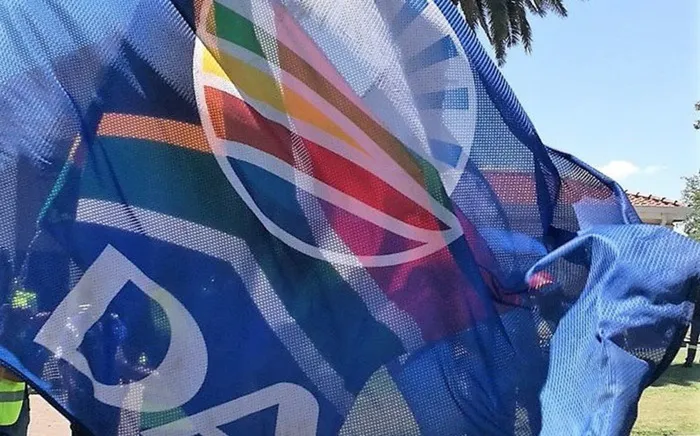DA suing its own government — legal blitz on ANC raises eyebrows in fragile GNU

A DA flag blows in a breeze with the South African flag behind it. Democratic Alliance (DA) has adopted an aggressive legal strategy, initiating at least four major court challenges against its Government of National Unity (GNU) partner, the ANC and several of its ministers but maintains double standards when needed.
Image: Independent Media Archive
The Democratic Alliance (DA) has adopted an aggressive legal strategy, initiating at least four major court challenges against its Government of National Unity (GNU) partner, the ANC and several of its ministers but maintains double standards when needed.
However, this assertive approach has raised concerns about apparent double standards.
While the DA frames these legal actions as principled efforts to uphold constitutional democracy, critics argue they reflect a pattern of political inconsistency and selective accountability.
High-profile figures such as Deputy President Paul Mashatile and Minister of Higher Education Nobuhle Nkabane have been the subjects of DA allegations ranging from corruption to fraud.
Most recently, Police Minister Senzo Mchunu has come under the party’s scrutiny. Despite the public attention these cases have received, none have resulted in a conviction — prompting questions about the DA’s legal strategy, consistency, and overall credibility.
The DA has also taken legal action against several key policy initiatives, including the Expropriation Act, the National Health Insurance (NHI) Bill, VAT increases, and Employment Equity reforms — all central to the ANC’s policy agenda and widely anticipated within the GNU framework.
Yet, the core contradiction remains: the DA entered the GNU with full awareness of these policy positions, raising legitimate questions about its current confrontational posture.
Now they’re in bed with their so-called enemies and suing them at the same time. Many including the ANC top brass saw this as hypocrisy and the way to discredit them.Instead of governing, the DA was grandstanding, instead of negotiating, it’s lawyering up. Each case has become a stage for performative outrage — dressed up as a constitutional principle — but critics aren’t buying it.
A week ago, IOL reported about a political analyst warning of severe repercussions for South Africa amid DA-ANC tensions.
If President Cyril Ramaphosa were to dare to fire the Democratic Alliance (DA) from the Government of National Unity (GNU), the Western powers might jump into action to punish South Africa severely, warned political analyst Zakhele Ndlovu.
Another political analyst, Sakhile Hadebe, said the DA was trying too hard to prove its existence and visibility in the GNU.He did not see the ANC voting against the budget of DA-led departments because, as the biggest party in the GNU, the ANC “must lead by example and properly.”
ANC secretary-general, Fikile Mbalula, has also slammed the DA for its behaviour in the GNU.Earlier this year, Mbalula described the relationship between them and the DA as “like milk and oil,” amid rising tensions over policies and other matters.
“The DA is an opposition political party, and ideologically, they are not an ally or in a marriage with the ANC,” Mbalula said.
''They behave exactly like an opposition should. It is upon the ANC to remain focused on our project of social transformation and not be distracted by the DA’s noise.
”A week ago DA leader John Steenhuisen announced the party’s immediate withdrawal from the GNU’s National Dialogue, citing a breakdown in trust and accusing Ramaphosa of shielding corruption-accused ANC Ministers.
“Until [President Ramaphosa] replaces words with action against corruption within his own ranks, the DA sees no further point in wasting our breath in endless talk shops with the ANC,” said Steenhuisen.
Get your news on the go, click here to join the IOL News WhatsApp channel
IOL Politics